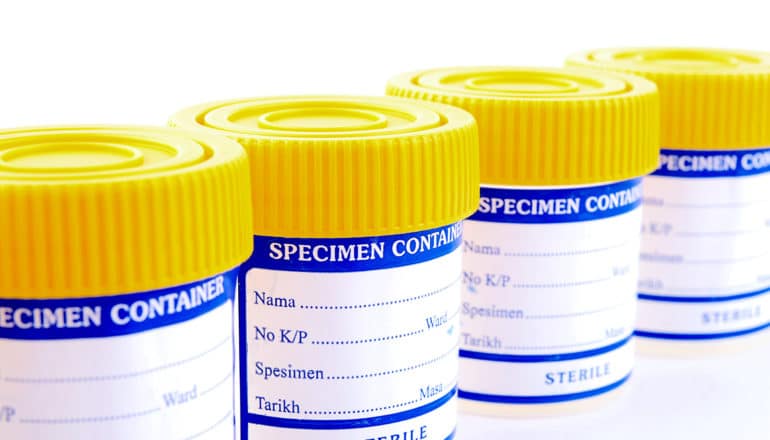
A new urine-testing system could allow people who have kidney stones to receive results within 30 minutes instead of the current turnaround time of a week or more, according to a new study.
Kidney stones occur due to buildup of certain salts and minerals that form crystals, which in turn stick together and enlarge to form a hard mass in the kidneys. The stones move into the urinary tract and can cause blood in the urine, considerable pain, and blockages in the urinary system.
Metabolic testing of a kidney stone patients’ urine to identify metabolites such as minerals and solutes that cause stones to form is key for preventing future ones. This testing currently requires the patient to collect their urine over a 24-hour period in a large container. The patient then sends the container to a lab for analysis and the results normally come back in 7 to 10 days.
“The lengthy process, cumbersome collection procedure, and delay in obtaining the results render 24-hour urine testing to be underutilized in clinical practice despite guideline recommendations,” says Pak Kin Wong, professor of biomedical engineering and mechanical engineering at Penn State and principal investigator on the study in Science Advances.
Expensive special equipment is required to detect urinary solutes and minerals for a test result, Wong says. The urine sample, therefore, has to be shipped to a commercial diagnostic lab for testing. To solve this, researchers developed a biomimetic detection system they call slippery liquid-infused porous surface (SLIPS)-LAB.
SLIPS is a dynamic, extremely low-friction smooth surface created by locking lubricating liquids in micro/nanostructured substrates.
Researchers got their inspiration for the idea from nepenthes pitcher plants—carnivorous plants with unique leaves shaped like pitchers and filled with digestive liquid. The plants have evolved extremely slippery liquid-infused micro-textured rims that cause insects to fall into the “pitcher.”
“There are many aspects we can learn from nature and our environment, and our research is an example how biomedical engineers can make good use of it,” Wong says.
SLIPS-LAB enables reagent and urine droplets to easily move over the slick surface of the testing device’s fluid addition channel and not get stuck. A Laplace pressure difference—a small pressure force due to surface tension, induced by the geometry of the device—drives the droplet. This enables the reactants to combine with the urine at the necessary timed rate for reaction.
“We demonstrated that SLIPS-LAB enables the reagent and sample to move themselves and perform the reactions for us,” Wong says. “It means the technology doesn’t require a technician to run any test machinery, so it is possible to do the test in non-traditional settings, like a physician’s office or even the patient’s home.”
The test results can then be read using a scanner or a cell phone, and a computer algorithm can then analyze the scanned image. All these steps, according to Wong, would take approximately 30 minutes in a physician’s office. An added benefit, Wong says, is that SLIPS-LAB is more cost-effective than regular, 24-hour testing.
“The low cost, rapidity, and simplicity of SLIPS-LAB would reduce the barrier for the clinician and patient to undergo stone risk metabolite analysis,” Wong says. “This would improve the management of patients with urinary stone disease and open new possibilities for stone patients to test their urine samples in mobile health settings.”
The research also demonstrated that the test also works as a spot test, which means a patient can monitor certain levels in their urine without 24-hour collection, says lead author Hui Li, a graduate student in biomedical engineering.
“SLIPS-LAB may open new opportunities in on-demand monitoring of urinary analytes and may potentially transform metabolic evaluation and clinical management of urinary stone disease,” Li says.
Additional coauthors are from Stanford University and Penn State. Penn State funding supported the work.
Source: Penn State
The post Urine test for kidney stones gives results in 30 minutes appeared first on Futurity.



















